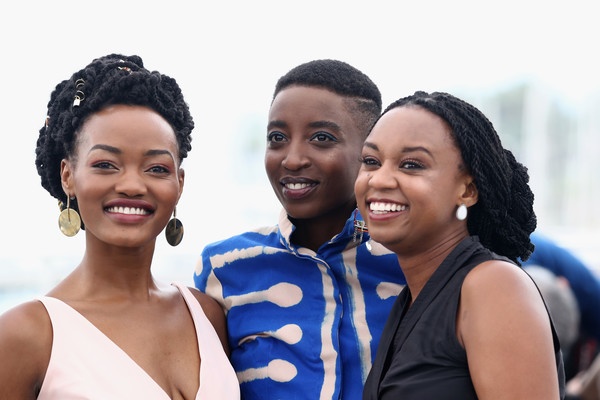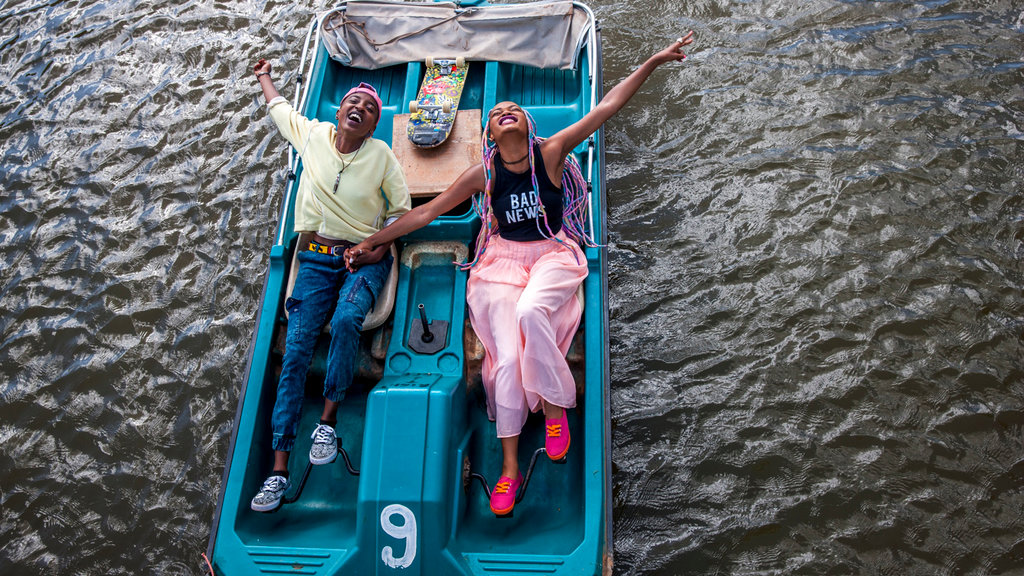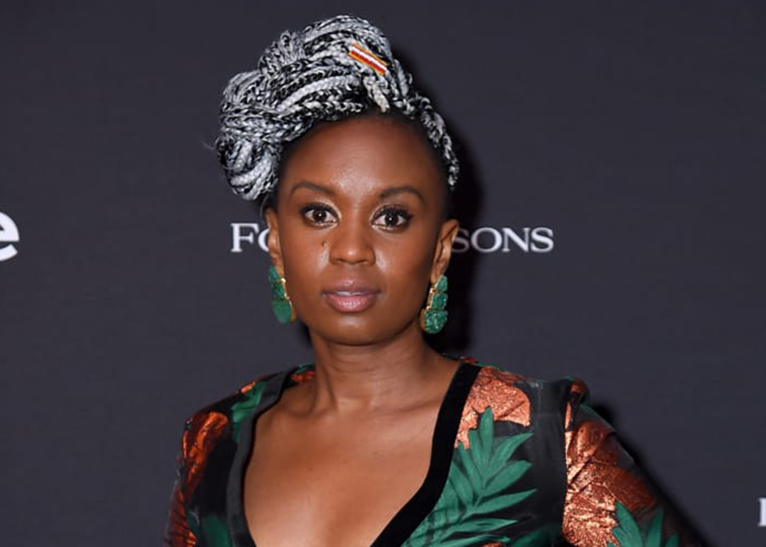Interview: Wanuri Kahiu on 'Rafiki,' her inspirations and becoming an activist
 Monday, April 22, 2019 at 6:20PM
Monday, April 22, 2019 at 6:20PM Rafiki is the second feature film from Kenyan filmmaker Wanuri Kahiu. It made its debut at last year’s Cannes Film Festival in the Un Certain Regard section, to critical acclaim. Initially banned in Kenya for its positive portrayal of queer romance, Rafiki won a landmark supreme court case chipping away at Kenyan anti-LGBT legislation. It tells a sweet hopeful love story between two women Kena (Samantha Mugatsia) and Ziki (Sheila Munyiva), who meet and fall in love as they are waiting to hear the results of their university entrance exams. Set in Nairobi and bursting with the colorful street style and music of the city’s vibrant youth scene, Rafiki is tender, cheerful despite the challenges for acceptance that its characters face from their families and society at large. Accordng to the film's press notes, Rafiki means friend in Swahili, and often when Kenyans of the same sex are in a relationship, they forgo the ability to introduce their partners, lovers, mates, husbands or wives as they would like, and instead call them “rafiki”.
We recently got a chance to speak with Kahiu about the film, the interview has been edited and condensed for clarity.
Murtada Elfadl: This film had quite a journey becoming a cause celebre because of the ban in Kenya. Did you anticipate that you’d become an activist...?
Wanuri Kahiu: No, not at all. I think I'm quite a reluctant activist in that sense because all I was trying to do is make a love story, make a film. Then as a result of that we had to fight for the film and that made me an activist. But my plan has always been to create work and my advocacy is through the work. I want to reach people through the art that I create.
Has it changed your perspective on the stories that you want to tell?
No, not at all it hasn't. I will continue to tell the stories that inspire me, that reflect the kind of world that I want to be a part of. I truly believe that my work is a service about communicating hope and joy. So in mission of that service, I don't think I need to change the way I work.It doesn't matter what obstacles are in my way, that's not going to change my approach to the work that I do.
One of the things that struck me about the film is that there is a streak of optimism and hope throughout the film, even when things sort of get tough for your characters. Can you elaborate on why that was important?
Well, because I believe that love is courage. No matter what kind of love, all of it is courage. Falling in love is one of the most hopeful experiences in life. More than anything, I wanted to communicate that feeling of falling in love through the film. What it feels like, the angst, the excitement, the giddiness, the discomfort. I wanted to communicate all of that.
 Munyiva, Mugatsia and Kahiu at Cannes
Munyiva, Mugatsia and Kahiu at Cannes
There are many films about love, how did you set out to make yours original? There’s a simplicity to the love story, but also depth.
I think that anytime you make real characters you will have depth, because you're talking about people who are a particular gender, class. We didn't shy away from that. Even though their life is complicated, they just wanted to be be together. One of our inspirations, and what we used to create the world of Kena and Ziki, was a line from a Lucille Clifton poem “what have you travelled towards more than your own state.” Trying to unpack that question, we came with many things that are in our story; the religion, the conservatism, the courage. Just how to answer that question for our characters, and with that came depth.
I wanted to ask you also about working with your costume designer and make & hair team to come up with the looks for Kenna and Ziki. How did you come with these two striking looks?
One of the things that we wanted to try and do is to get the girls to start looking more and more alike as the film progressed. Also we wanted to make sure that Kenna had touch of iconography in everything that she did. We wanted her to have print fabric in all of her clothes. As for Ziki we wanted her to look lighter in every way, if that makes sense.

I read that you referenced artists like Zanele Muholi, Mickalene Thomas and Wangechi Mutu whose work express femininity, strength and courage - how did their work inspire you?
With Mickalene we were really inspired by her art and we used it to inspire the background of Kenna’s mother house. So everything in the house, the textures of the fabric in the house, the character’s clothes - all that was inspired by Mickalene, we tried to bring out the incredible harmony that shows in her work. For Ziki’s house Wangechi allowed us to use a print of hers to influence the colors in that house.
Did you look at other queer films tonspire the look or the tone of the film?
I looked at many love stories. There’s a beautiful film called Breathe by this amazing filmmaker whose name escapes me now. She had another film called Les Adoptés.
Melanie Laurent. Is that who you are talking about?
That's the one, yes. Just amazing. So the two movies that she made were really, really great. Very influential in the work that we did with Rafiki.
Any other inspirations?
One of my favorites is Black Orpheus, by another French filmmaker [Marcel Camus]. There's something about the vibrancy and youth of that story. Just the feel of like life in that zone. That really influential as well.
 I understand that the film opened in Kenya but only for seven days. Do you think it reached an audience in that short period? Do you have plans to show it again?
I understand that the film opened in Kenya but only for seven days. Do you think it reached an audience in that short period? Do you have plans to show it again?
Well it did reach an audience. Many people saw it at the time that it was in the theaters, which is amazing. As for our plans, apart from the fight for the film, we're fighting for larger freedom of expression. We're back to the court fighting for constitutional rights of freedom of expression. This case that we are working on, if we win, it’ll allow not only this film but other films that have been banned to be seen. The law on which the film was banned is an old colonial law. The current constitution was created in 2010, there are no laws on book that supports the new constitution. So we are working on that.
Rafiki is now in limited release.



Reader Comments (6)
Just thought I would remind you why High Life is so good: When you commented on all the excessive images of sperm and breast milk I jokingly said the movie was a sequel to her 2010 film with Isabelle Hupert, called White Material.
But who cares when probably the best song of 2019 (which won't get nominated) ends this miraculous movie, sung by Robert Pattinson. Just fucking gorgeous. I've been listening to it for 3 weeks now. I hear it in my dreams, and when I wake up and when i wander from one room to another, left breathless. Divine.
Willow
And of course I forgot to leave the song: https://www.youtube.com/watch?v=8xNSN6Kd8rI
Willow (feat. Robert Pattinson)
Willow, where are you hiding now?
Willow, where are you hiding now?
In the dappled light, deep in the trees
The spiders and the centipedes
Crawl across your hands, across your knees
Willow, do you walk across the sand?
Willow, do the waves crash and fall?
And their fingers tickle at your feet
And pull a little as they retreat
Do you feel the rushing forward
Though you're standing still?
Willow, are we rushing forward, are we standing still?
Willow, are we rushing forward, are we standing still?
Willow, do you crouch among the rooftops?
Willow, listening to the city wheezing?
And your dreams, they stretch beyond the clouds
And past…
The Video: https://www.youtube.com/watch?v=8xNSN6Kd8rI
And to complete this stream of whatever, is the band most influential upon the Tindersticks during the 90's the best band of that century (at least according to Kurt Cobain); Mazzy Star:
https://www.youtube.com/watch?v=2FdP0eS47ts&list=RD8xNSN6Kd8rI&index=2
https://www.youtube.com/watch?v=VCtqzkftXRE&list=RD2FdP0eS47ts&index=31
You probably know this stuff already Murtada,so I apologize if I'm being stupid. Just thought in case you were not aware....la-de-da
The problem about "Rafiki" is when you leave out the political importance of the story, the beautiful people, costumes and sets, there isn't much left, really.
I found the story mechanical and academic in its' structure. The characters (with the sole exception of Kena) felt vague and underdeveloped.
I don't know, maybe I'm immune to all those golden hour, backlit portraits. I'd much prefer some solid stakes and a little insight into the characters' psychology.
Such an interesting interview; thanks for providing it! I like reading different interviews, and I think it's the best way to see someone's position on various issues or find out about some personal experiences. Once, I was working on one project and needed to collect some data, and I also decided to interview people. It was the only right idea because I managed to collect all the info I needed and then analyze everything. Also, I have one source where I worked to Find more info about interviews and also came across some interesting ideas. And after conducting a few interviews, I understood that I like that role, and maybe in the future, I'll think about becoming a professional interviewee and have a chance to talk with different great personalities.